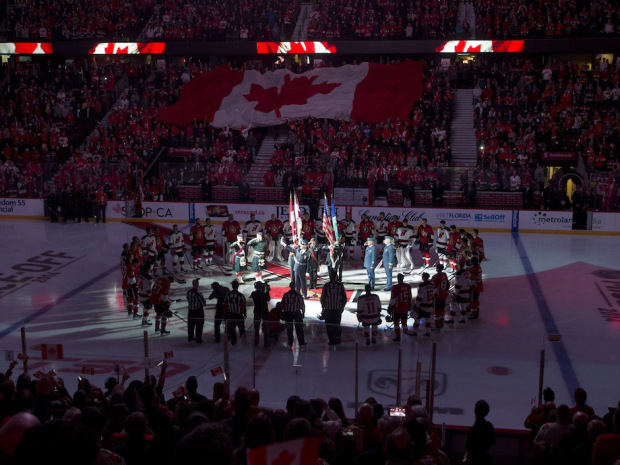"Reflections on the events in Ottawa and ice hockey"
November 13 The shooting death of an unarmed soldier challenged Canada’s attitudes about multiculturalism and patriotism, writes Alvin Ma, 23, a Commonwealth Correspondent from Canada, who argues that sport can help heal community during divisive times.
The shooting death of an unarmed soldier challenged Canada’s attitudes about multiculturalism and patriotism, writes Alvin Ma, 23, a Commonwealth Correspondent from Canada, who argues that sport can help heal community during divisive times.
I’m glad to see that my professor and former Commonwealth Advisory Body on Sport chair Bruce Kidd is cited in Malcolm McEachern’s post on sport for development and peace. Professor Kidd introduced me to the Commonwealth Correspondents website and encouraged me to share my Canadian perspectives with the rest of the world (such as my own post on a sport for development and peace program using ice hockey).
In Canada, an ongoing top news headline is the death of Nathan Cirillo, a Canadian soldier who was shot while he was performing ceremonial guard duties outside the National War Memorial in the capital city of Ottawa. Moments after the initial shooting, the perpetrator entered the Parliament building with his rifle, where he was killed by the Sergeant-at-Arms of the House of Commons (who is normally known for performing duties such as placing the ceremonial mace on the Parliamentary clerks’ table) after a gun battle in a hallway steps away from the full meeting rooms of important politicians. Particularly because the shootings occurred two days after a separate attack on military personnel in the neighbouring province of Quebec which killed another Canadian soldier, there was an initial state of shock. Violent crime against authorities in Canada is comparatively rare.
In Canadian history classes, we still learn about the 1970 October Crisis and the 1990 Oka Crisis, where a total of two people died. This is not to minimize the importance of these victims and this is certainly not to whitewash systemic injustices such as the disproportionately higher rate of Aboriginal victims of violent crime, but Canada is perceived to be one of the safest countries in the Commonwealth and a refuge from persecution and civil war.
I have written extensively about multiculturalism in sport (for Bruce Kidd and on this website as well). A week before the Ottawa shootings, the Canadian Department of Citizenship and Immigration partnered with the National Hockey League to host special citizenship ceremonies, culminating with these new citizens singing the national anthem of O Canada before several professional ice hockey matches in front of sold-out arenas. The applause they received shows that fellow Canadians can be welcoming, particularly when they take an interest in the quintessential sport of ice hockey.
However, some elements of xenophobia are still present. While local Canadian residents rallied to repair it, a mosque was still vandalized. While a viral video of a social experiment shows how Canadians react to an overt display of xenophobia, the comment section is still littered with hate-filled remarks. It is a sensitive time in Canada and sometimes hyper-nationalism can bring out an us-versus-them mentality, similar to cheering for one team to violently defeat its opponent in an ice hockey match. While ice hockey can be divisive in that sense, it can also be used as a form of healing, with outward displays of emotional unity.
Before the national anthem for the first ice hockey game in Ottawa after these shootings, players from both teams stood side by side with military personnel to pay their respects. During the singing of the Canadian national anthem in Ottawa, the singer decided to hold up the microphone to the audience before concluding with the final line of the anthem, “O Canada, we stand on guard for thee!” While this pre-game ceremony was undoubtedly moving, I can’t help but think of other sociocultural literature, some of which published by Bruce Kidd, about how sports cannot simply be an apolitical distraction from daily life. Scholars who are more politically left-wing such as Tyler Shipley have critiqued the connection between militarism and ice hockey.
While I do not fully agree with Shipley’s ideas, his article is still worth reading in order to challenge mainstream beliefs. While I wear a poppy leading up to Canada’s observance of Remembrance Day on November 11th, I also do not believe in simplification of history. I believe in having current and future military missions take on humanitarian roles rather than indiscriminate killing, though I recognize that the world is a much more complex place and that sport for development and peace programs must adapt accordingly. While I don’t have all the solutions, I do remain optimistic for a more peaceful and inclusive future.
Photo: http://wpmedia.sports.nationalpost.com/2014/10/nhl_senators_vs_avalanche_hockey_20141025.jpg?w=620
…………………………………………………………………………………………………
About me:
I’m currently a student and research assistant for the Centre for Sport Policy Studies at the University of Toronto. I also teach English at an ESL language school and serve as a private tutor for various other subjects. Passionate about teaching, sports, and politics, I hope to blend these interests and one day teach university-level courses on the politics of sports.
………………………………………………………………………………………………………
Opinions expressed in this article are those of the author and do not necessarily represent the views of the Commonwealth Youth Programme. Articles are published in a spirit of dialogue, respect and understanding. If you disagree, why not submit a response?
To learn more about becoming a Commonwealth Correspondent please visit: http://www.yourcommonwealth.org/submit-articles/commonwealthcorrespondents/
…………………………………………………………………………………………………




